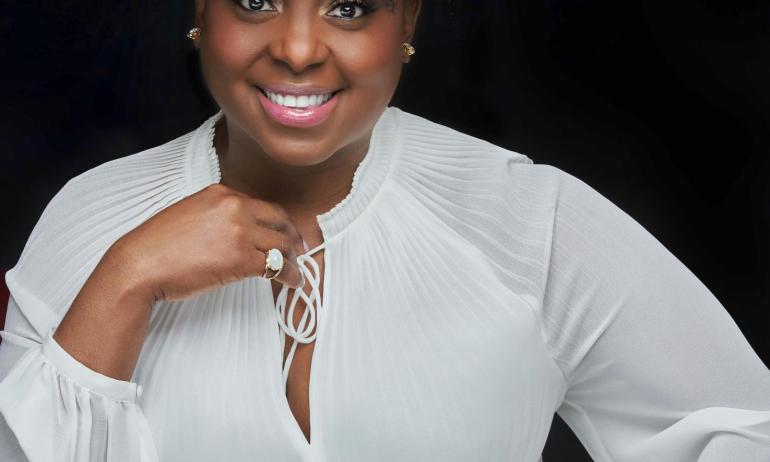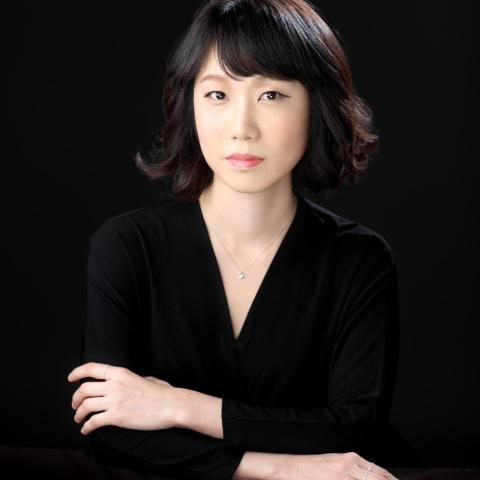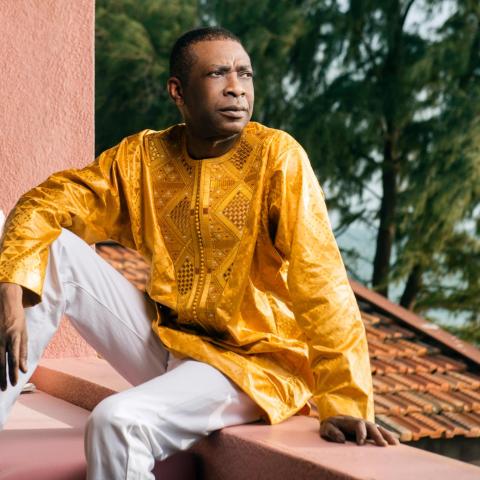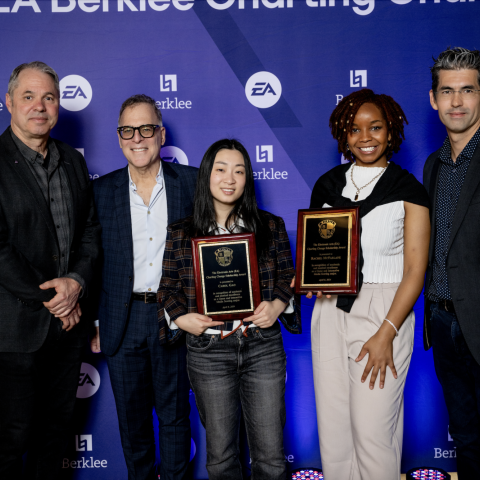Lalah Hathaway: Multiphonic Renaissance
Lalah Hathaway '90 Ron Batzdorff
In the music industry, where marketing is done through polished PR campaigns, eye-catching music videos, and social media strategies, it’s refreshing to see an artist garner attention for being herself. Lalah Hathaway’s cameo appearance singing the song “Something” on last year’s live album and video. Family Dinner, Volume 1 by Snarky Puppy lit up YouTube because of video footage of Hathaway’s multiphonic singing. Producing two pitches at once is not unusual for singing Tibetan monks and in some ethnic music styles, but not in American popular music. Hathaway has experimented with the technique since she was a teenager, but she hadn’t found the right showcase for it until now. Her performance against Snarky Puppy’s funk/jazz accompaniment to “Something” sent the video viral and earned Hathaway and the band the Best R&B Performance Grammy last February. It was the beginning of a career renaissance for Hathaway.
No stranger to music fans, she has released six albums under her own name and collaborated on many others with top musicians of the jazz and r&b world over the past 24 years. She’s landed on the r&b charts with her own albums, and The Song Lives On, her collaboration with pianist Joe Sample, hit number two on the jazz charts. Her cover of “Forever, for Always, for Love,” a tribute to Luther Vandross, hit number one on the adult r&b charts. All this success notwithstanding, things rose to a new level for Hathaway after winning the Grammy.
Last summer, she completed her first tour of Europe, headlining shows at top festivals and clubs. While there, she also sandwiched in appearances with jazz/r&b pianist Robert Glasper and the Metropole Orkest as well as a gig with bassist Christian McBride. At the least, her European foray opened doors for return bookings and started the gears turning for a future recording with Vince Mendoza and the Metropole Orkest and a bass-vocal duo outing with McBride.
Born in Chicago, the Hathaway family, comprising father Donny, mother Eulaulah, sister Kenya, and Lalah, were all endowed with abundant musical gifts. Donny Hathaway was a producer, arranger, songwriter, and session pianist and singer before establishing himself as a major voice in soul music during the 1970s. His 1972 album Donny Hathaway—Live is hailed as one of the best in the live-album genre. He enjoyed considerable success as a solo artist and with duet recordings with Roberta Flack until his untimely death in 1979. Lalah’s mother, Eulaulah, was a classically trained singer, and Kenya ’95 is a sought-after background vocalist who has sung on some 34 episodes of American Idol and worked with George Duke, Christina Aguilera, Stevie Wonder, Céline Dion, and others.
For Lalah, the legacy of her father has served as an inspiration rather than a shadow. She inherited his gift for songwriting and for crafting unique interpretations of the songs by others. She formally entered the business with her eponymous debut album recorded while she was a Berklee student and released in October of 1990. Hathaway has issued albums on such labels as Virgin, Mesa/Bluemoon, GRP Records, and Stax, and she’s currently in the final months of a PledgeMusic campaign to fund a new live album. Given that her live work catalyzed her recent career resurgence, making a live album shows good instinct and continues a family tradition.
What was your intro to music?
My mom used to take voice lessons at the American Conservatory of Music, and when I was three years old, I would try to play for her lessons. I was a student at the same conservatory learning classical piano.
When did your voice become your main instrument?
It was always my instrument, I’ve always sung. At the point when I came to Berklee, people were telling me that I sang well, and I thought, really? By that time it was just my path.
Witnessing your dad’s professional success, did you decide at a young age to pursue a music career?
That developed later on. I knew that my parents were in the music industry, but when I was little, I thought everyone’s parents did music of some kind. When I got to high school and college, I noticed that people seemed to hold me in high esteem because I was Donny Hathaway’s daughter. They wanted to hear me.
How did that make you feel?
I never had a problem with it. There was never a time when I thought people should listen to me and not my dad. I never had a sense of competition with what he accomplished. I am happy that people loved my dad—that means they might love me. The best compliment I get is when people tell me they think my dad would be proud of what I am doing. Someone once asked me if I channel my dad when I’m singing. I don’t know anyone who sits around thinking they are channeling—I don’t. But I do feel that my father is always there.
How did you choose to come to Berklee?
I can’t remember how I first heard about Berklee. Two friends in high school were thinking about going there. Later, I started listening to what was considered jazz at the time—Jean-Luc Ponty, Pat Metheny, Kenny Wheeler. I had been listening to pop and r&b and didn’t have experience with jazz, and my mind started shifting. So when it came time for me to pick a college, my mom wanted me to go to Howard University where my parents had met. We went to visit Howard and then came to visit Berklee. Boston was a big deal in my family because my grandfather had graduated from Boston University. When I got off the Amtrak train in Boston, I knew almost immediately that there was something there for me. I only applied to Berklee.
What was your major?
Professional Music. I just wanted to be a real musician and hang with the guys, learn to sing Jaco or Scofield solos, transcribe music, and be able to arrange it for other singers. I didn’t care so much about my major as I did about learning enough so that other musicians would respect me.
You started writing songs when you were in high school. Do any of the early ones still hold up for you?
Some hold up. I wrote “So They Say” pretty early on. I have been a singer and songwriter all my life, but lately, my songwriting has taken a backseat to my primary expression: singing. I am trying to find the songwriting voice inside me again.
When I came into this industry, I felt that some of my songs had this melancholy, show-tune vibe. I always received encouragement to write for the radio. And even though I really don’t do that, there is a mindset of wanting to compete in this business and to have a voice on the radio. I have to find the songwriter voice I used to have. I put it away for a while to work on my sound and singing, but it’s coming back. I did a lot of writing and cowriting for my last two records.
It’s amazing how much of your life you got into three verses and a chorus in “Little Girl” on your Self-Portrait album
I cowrote this with Rex Rideout, Rahsaan Patterson, and Sandra St. Victor. We had the music and I asked Rahsaan if he heard anything for it. He sang, “Just a little girl in a big world.” Instantly I felt that was the hook. Sandra is a supreme lyricist who knows how to focus in on what is going on with you, put it in a pot with everything else, and cook it up. She came and stayed with me for a couple of weeks and we talked about my childhood over some bottles of wine. I told her my mother drove Lincolns and used to fry fish and was a single parent in a lot of ways. I feel like that song is a representation of my life.
I’ve done some radio interviews where you get four minutes at drive time, and sometimes the person will ask, “Who is Lalah Hathaway?” The answer is on these records. Anything I need people to know about me is in the songs.
I think the audience gets more from the music when they feel an artist is revealing him or herself in the songs.
Absolutely—that’s the only way for me. I recently wrote a tweet saying that the thing I relate to most in an artist—even when it’s happy—is the pain or the blues. That’s a universal feeling. No matter how many fast songs we have in a show, I can feel that the audience doesn’t connect until we throttle back and I wring them out. That’s what they want. They come for the catharsis, the blues. They want to feel it. Then they are crying at the fast songs too! All people have pain and I connect with them on that level.
When you get that emotional reaction from the crowd, it must feel special.
It used to freak me out a little, but as I get older, I get it. I used to think that I was the only one who cried while listening to Donny Hathaway records. Many people could feel the pain and the joy in his music. I hear all the time about someone who sounds “just like Donny Hathaway.” A lot of people have tried to mimic his sound, but nobody has that pain. You can’t duplicate that.
You made your first album while you were a Berklee student.
Yeah. I had Virgin Records behind me, but I basically made the record myself. I would take the Amtrak train from Boston to L.A. to demo songs. I finished it and had all these thoughts about wanting to be a jazz rather than pop musician. I wanted to challenge myself, and resisted moving to L.A. All my friends were moving to New York and I knew they’d be at the 55 Bar seeing Mike Stern without me. I felt the music culture in L.A. wouldn’t be what I wanted as a 20-year old. But, at some point the light came on and I knew I would do whatever I was going to do wherever I was. I think I am a little softer for living here than I would have been if I’d moved to New York. But I appreciate that softness.
What was the motivating factor for you to move to Los Angeles?
My label told me in 1991 that it would be best for me to be here. They mentioned all of these television shows that could help me if I was out here. I was sad about the decision. I was watching what was happening in Boston and New York from out here and was weepy because I missed the places and my friends. That’s when I wrote the song “Boston.”
When did you get comfortable with the musical life here?
It was a big adjustment to grow up in Chicago, go to school in Boston, and then come to L.A. But I have met some incredible musicians here, and it’s great to be able to just pop over to see Marcus Miller or Nathan East. After all these years, I am meeting more people who are native to L.A. Patrice Rushen and Gerald Albright are natives.
You left Stax after two albums. What label are you with currently?
I don’t have a label at the moment but I am talking to a few. Right now I am doing a Pledge Music project. I’ve had an audience with me for nearly 25 years, since my first album came out. So my plan is to make a live record and offer those who support the campaign special perks. We offer tickets to the live recording, a chance to come onstage with the band, and other things that I think they will be interested in. [Visit pledgemusic.com/projects/lalahhathaway.]
Was it a big decision to cover some of your dad’s songs?
At one point I told people I wouldn’t cover my dad’s songs. After Natalie Cole did “Unforgettable” people were saying I should do something like that. But I didn’t want to do what Natalie did. I wanted to meet it at my own pace.
It started when I was at a party at Patti LaBelle’s, and a guy started singing “A Song for You.” He was doing a fine job, but then I sang it for Patti and after that I began singing it at my shows. I put “You Were Meant for Me” on the record because it was a safer song, the happiness of it and the arrangement fit with the record. But it’s going to take a while for me to delve into the pain and the blues of my father’s catalog.
In a 2005 Berklee Today profile, you said were figuring out whether hip-hop would be part of your musical future.
A lot has changed since then. I feel now that I don’t need to fit into the paradigm of what is. I ‘ve always been different and stuck out. There have been things that were distinct that I thought would fit in here or there, but I realize now that I don’t fit in and that’s OK. The final straw came last year when I auditioned for a spot on the reality show R&B Divas. I went in and talked to the producers. They thought I was funny and called me back for a second round of talks. People were saying, “OK!” and then I didn’t get it. I was bummed. I don’t know if they didn’t view me as an r&b diva or if I just didn’t fit in with the girls they chose, but I don’t take it personally. When I watched the first episode, I felt that not getting it was like a message from God: “This is not where you belong. Stop trying to fit in and create your own paradigm.” And I have done that. After all these years, I started singing a chord.
Yes. After a long career, you revealed a facet of your singing that’s so distinctive—harmonic singing—on the track “Something” with Snarky Puppy. That moment is so electric when you watch the reaction of the musicians in the band.
It makes me so happy. To see the other musicians collapsing and laughing [in amazement] was the best gratification ever.
Had you planned to do that or was it completely spontaneous?
When we rehearsed the tune I tried it and it didn’t work. Sometimes it just doesn’t work. If you watch the video, the first two times I did it, it was nothing special. The third time it was good. Then the fourth time, I shifted with the chord change without knowing where it was going, and that was a moment. I am so glad it was caught on tape.
That video has gotten nearly 3 million views on You Tube and must have brought you new fans. Then the performance earned you and the band a Grammy Award. How did that make you feel at this point in your career?
I thought to myself, “Is that all I had to do—sing a chord—to get that kind of attention?” I would have done that in 1990 if I knew people wanted to hear it! To come full circle with a cover version of a cover song I did when I was 18 or 19 years old was a sweet moment. I was pretty proud and excited to share that with Snarky Puppy. It was surreal when it was announced that we’d won.
This couldn’t really have happened before YouTube. Everyone got to see the moment rather than just hear it on a studio album.
That’s really why I never did it before. If you’re in a studio, you can make anything happen; you could make a sound like that with Auto-Tune or any number of things. So I never did it on record. I’ve wanted to make a live recording for a long time, but people keep telling me that a live record is hard to market and isn’t good for radio. But look, “Something” was live and we got a Grammy for it. So I feel now that I have to just continue to walk my path.
What led to the connections enabling you to collaborate with musicians like Kirk Whalum, Marcus Miller, Dave Sanborn, and Joe Sample?
The first person to call me after my first record came out was Marcus Miller. I don’t really know how that connection came about. Then I did the album with Joe Sample in 1997and Kirk Whalum happened to be the saxophonist on it. Later, Kirk wrote a song for me to sing on his record, and that album won a Grammy. I met Terri Lyne Carrington when I was 20, and I’ve met many other people through her.
Do you mainly collaborate when you write songs these days?
I either collaborate or write by myself. Sometimes I get a whole song and sometimes just a title. I had the first line of “Boston” when I moved out here, and it was six months before I finished it. “Tragic Inevitability” was something I just sang at the mic. Sometimes I get lucky. There is a vulnerability that goes with writing your life down in songs and I kind of stepped away from that for a while. Now I have to step back up to it.
Do you feel more comfortable with that vulnerability in your writing?
I don’t know if I’m more comfortable with it, but I know I’ll feel uncomfortable if I don’t do it. Nothing thrills me more than to see a record by John Mayer, Joni Mitchell, or Stevie Wonder and read that it was all written and produced by the artist. That’s a total expression. Until I get there, I’ll still have a little reserve.
What’s ahead for you?
The live album is the next big thing, there is still some time left in the PledgeMusic campaign. I am ready to make a live record. After everyone dismissed the thought of me doing a live record, I got a Grammy for a live performance. That really solidified the idea for me.
We have a couple labels on the hook now. I am not as concerned with the label as I am about getting the music to as many people as possible. I did a single, “Shine” and released it by myself just to see what’s needed. I clearly don’t have enough money to get it on the radio; you need the big guns if you want to compete in the upper echelon. And even with a lot of money behind a song, it still might not stick when they put it out there.
After the Grammy for the song with Snarky Puppy, you might conclude that anything can happen in today’s music business.
It’s like things are growing now. It’s funny to have been doing this for 25 years and things are really starting to pop now! When I was 15 or 16, I thought I wanted to be a superstar and play places like Madison Square Garden. Then I realized that that was a different world. But a couple of years ago, I opened for Prince a few times and got to play at the Meadowlands. I was on that stage thinking, “Anything is possible.” You just never know.




